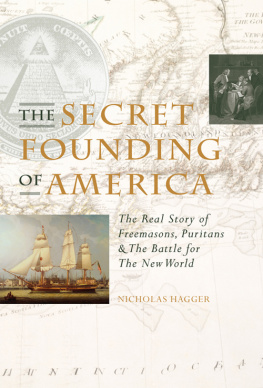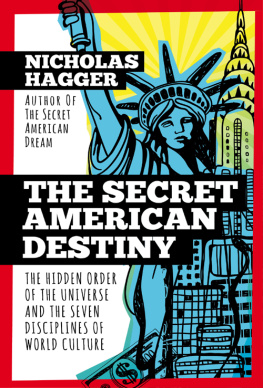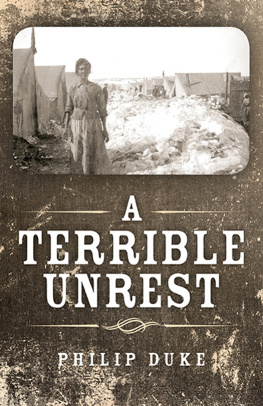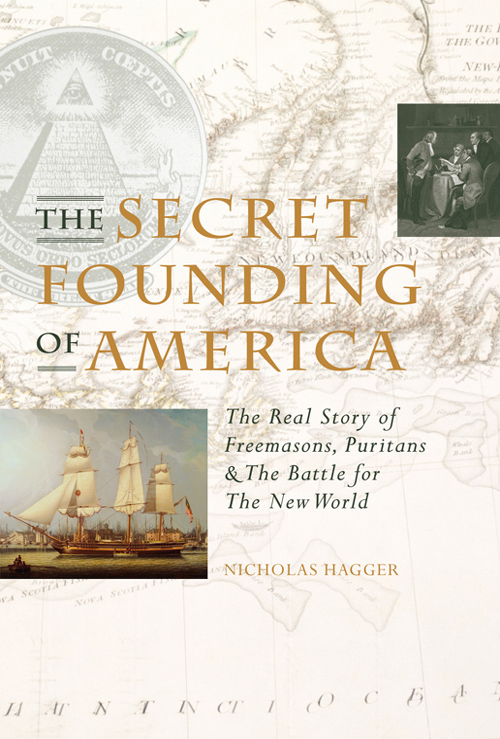Nicholas Hagger has written more than 25 books on history, literature and philosophy, including a study of the founding, rise and fall of civilizations. He has lectured at universities in Baghdad, Iraq; Tokyo, Japan (where he was a Professor); and Tripoli, Libya. He has followed a career in education, and travelled widely. For seven years he owned the house in Suffolk in which the Jamestown settlement is thought to have been planned, and he was involved in the discovery of a skeleton which was thought to be that of Bartholomew Gosnold. He has appeared many times on radio and television, and has written articles in newspapers on the subject of the founding of America.
By the Same Author
The Fire and the Stones
Selected Poems: A Metaphysicals Way of Fire
The Universe and the Light: A New View of the Universe and Reality
Collected Poems: A White Radiance 1958-1993
A Mystic Way: A Spiritual Autobiography
Awakening to the Light: Diaries, Volume 1, 1958-1967
A Spade Fresh with Mud: Collected Stories, Volume 1
A Smell of Leaves and Summer: Collected Stories, Volume 2
The Warlords: From D-Day to Berlin, A Verse Drama
Overlord: The Triumph of Light, An Epic Poem in 4 volumes
The Tragedy of Prince Tudor
The One and the Many
Wheeling Bats and a Harvest Moon: Collected Stories, Volume 3
The Warm Glow of the Monastery Courtyard: Collected Stories, Volume 4
The Syndicate: The Story of the Coming World Government
The Secret History of the West: The Influence of Secret Organisations on Western History from the Renaissance to the 20th Century
The Light of Civilization
Collected Poems 19582005
Classical Odes
Overlord: one-volume edition
Collected Verse Plays
Collected Short Stories: 1,001 Very Short Stories or Verbal Paintings, 19662006
The Last Tourist in Iran
The Rise and Fall of Civilizations
The New Philosophy of Universalism
The Libyan Revolution
THE SECRET FOUNDING OF AMERICA
The Real Story of Freemasons, Puritans, & the Battle for the New World
NICHOLAS HAGGER

For the people of East Anglia and Virginia who heard me on the planting of America and wanted to know more, including Bill Kelso; for Michael Mann, who entrusted me with an idea he had long had in mind, and for Duncan Baird, who saw it through; and for Ann, who walked with me in Gosnolds footsteps.
Not only were many of the founders of the United States Government Masons, but they received aid from a secret and august body existing in Europe, which helped them to establish this country for a peculiar and particular purpose known only to the initiated few.
Professor Charles Eliot Norton of Harvard, a century after 17761
CONTENTS
INTRODUCTION
SKELETON OF A PLANTING FATHER
T he United States of America boasts the most advanced civilization the world has ever known. Its technology is awesome. It has reached the moon, sent spacecraft to the far reaches of our solar system and produced images of our galaxy. Its satellites transmit instant pictures from across the world on our television screens. Its computers send instant messages round the globe via the internet. Its precision-bombing has raised war to a new level, enabling surgical strikes to be made while limiting damage. Its skyscrapers, aircraft, cars, housing and potential for wealth are unrivalled, and it has opened its doors to the tired, the poor, the homeless huddled masses yearning to breathe free and admitted refugees from all corners of the world. It stands for liberty and democracy and is a beacon of freedom to the rest of the world, which is apprehensive, fearing US domination and world hegemony.
All this technological inventiveness and administrative genius has developed very rapidly in a country that only 400 years ago was an empty landscape occupied only by native Americans, a place of great scenic beauty but also a terrifying wilderness. Into this vast, seemingly sparsely populated tract came Europeans from England, Spain and France at a time when navigators were exploring the limits of the Earth. The prevailing view was still that the Earth was the centre of the universe and the planets travelled round it in spherical orbits. New heresies were asserting that the Earth revolved around the sun and that its movement caused the stars to appear to move. But it was only a theory that the world was round and that a ship sailing west might reach the Indies of the East. Rumour had it that beyond the mariners horizon there was a huge waterfall that ships would plunge over and be lost forever more.
In this bewildering time European voyagers set sail in small-masted ships that leaked like old tubs to unknown destinations, knowing they would be absent for a year or two and unsure whether they would ever return home. What drove them? Some, like Vasco da Gama, were in quest of knowledge. Some, gentlemen adventurers, were seeking their fortune and hoping to bring back cargos of gold and diamonds, or at least precious wood, that they could sell for commercial gain. Some hoped to own land, an impossibility for the poor under the medieval feudal system. Some were fleeing religious persecution and yearned for the freedom to worship in the way they wanted without being penalized by the State.
When they reached America after their heroic voyages, they planted settlements, and a backwoods life of great primitiveness, of hand-hewn wooden huts, shacks and fences, grew up along the eastern coast. As more colonists arrived, the lands that were settled grew more extensive. For more than 150 years there were English colonies in the north. Eventually these threw off their colonial yoke, became independent and wrote themselves a constitution, which enabled the United States to grow into the superpower it is today.
This book is about the founding of the United States from the planting of the first settlements to the constitutional founding of 1787. It shows that while religion was behind the first plantings, circumstantial evidence indicates that Freemasonry was also present and that a secret Deistic Freemasonry, subscribing to a non-Christian concept of God and hiding behind a religious faade, inspired the constitutional arrangements that prepared the way for todays superpower. Indeed, the first United States was a Masonic State. As we shall see, Freemasonry remained strong during the Civil War and is still a very powerful force behind the apparently Christian United States today. We shall see that today Freemasonry has an agenda for a new world order, a federal-continental United States of the World in which nation-states are subsumed as states within regional blocs.
All was not as it seems in the early planting of America. The story that schoolchildren learn is that Separatists came over on the Mayflower in 1620 and settled at New Plymouth. But they were not the first. Before this there is a real story involving Jamestown, which was settled in 1607. That is what America has chosen to base its 400th anniversary on in 2007. But, as we shall discover, even that is not the true start of America.
I first became interested in the founding of America when I did research for my study of the origin, growth, rise and fall of 25 civilizations, which became










